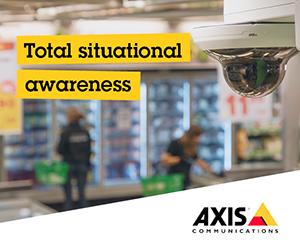INDUSTRY FOCUS
The Roads Most Travelled
by John Wilson, Executive Editor
Robert Frost’s poetic maxim “the road less travelled” conjures up romantic images of freedom, adventure, and discovery, but what about the more prosaic road most travelled—a description best afforded to the 2,241 miles of seemingly endless grey motorways carrying Britain’s 30 million motorists on a staggering 94 billion journeys every year?
Most business heads of risk would accept that crime rates impacting their businesses are heading in the wrong direction—north rather than south. But imagine if you include factors such as mobility, speed, and organised crime gangs using the UK’s busiest road corridors as their escape routes; you are then travelling on a one-way journey towards heightened risk where the open road is replaced with a potentially criminal cul-de-sac.
It is not hard to recognise the potential “weaponising” of the issue simply by shoehorning a seemingly endless number of human neuroses into the protective shell of a vehicle and catapulting them at seventy miles per hour along the UK’s motorway network, a factor that breeds additional stress, anxiety, and potential road rage from millions of previously mild-mannered motorists.
Indeed, as mentioned, the road journeys themselves can become a conduit for crime, a network for organised gangs to cross the forty-three different force borders to avoid detection. In the more mundane every day, speeding, drink or drug driving, using mobile technology while behind the wheel, or simply being on the road so long that it induces tiredness can make criminals of even the most law-abiding citizens and result in “collars” for motorway Police or the Highways Agency enforcement teams. These are the contemporary offences on our over-subscribed twenty-first century network that was designed to assist the social and corporate mobility and individual freedom of a previous era but failed to keep up with the drivers of change.
The M1, the UK’s first full-length motorway, which opened in December 1959, was built to carry 14,000 vehicles each day, but today it carries more than ten times that number. Indeed, on its first day it carried 13,000 vehicles and more than a hundred broke down in the first ten miles. Even in the digital world of Google Maps and satellite navigation, delays caused by breakdowns, accidents, over-heated engines, and frayed tempers further add to the daily grind and NOx fumes from idling engines, not to mention the heightened stress levels generated from missed meetings, rendezvous, and connecting flights.
Similarly, the 118 miles of the M25 London Orbital is a circular system around the capital, save a few miles of the A282 toll road over the Thames at Dartford. The road, which is the second-largest gyratory system in Europe (behind Berlin’s), is the butt of motoring folklore and even the subject of a song by Chris Rhea entitled The Road to Hell. The M25 could be the subject of even less romantic imagery if and when it is diverted to make way for the planned third runway at London’s Heathrow airport, which will likely cause major disruption for thousands of daily commuters.
It is little wonder that our attitudes to motorway travel have changed when faced with the fact that our daily commutes can be so unpredictable and disruptive. What used to be the routes to anywhere have been rebranded as the roads to nowhere because at least a quarter of traffic delays are caused by accidents or roadworks. The remainder is simply due to the sheer volume of traffic with the average British motorist spending the equivalent of more than two weeks every year stuck in congestion.
The 236-mile long M6 is the biggest of the UK’s motorways stretching from the Calthorpe in Leicestershire to the Scottish borders and is equally vulnerable to disruption and stressed-out drivers. On 9 January this year, the road was shut in both directions near Stoke-on-Trent as Police and Border Control rescued twenty-seven illegal immigrants from the back of a lorry.
Such is the strategic importance of this stretch of motorway—the convergence points of the M6, M42, M5, and M54 motorways—that the RAC control centre is located overlooking the motorway at the intersection with the M5, one of the busiest stretches of road in the world. Unsurprising too is the fact that the West Midlands constabulary monitors the mobile misdemeanours of travelling gangs through the auspices of its 200-officer strong Central Motorway Police Group from a nearby high-tech control centre in Perry Barr while Highways England has its regional control centre at Quinton just a mile from the M5.
Such was the stress on this particular stretch of the M6, the Department for Transport agreed fifteen years ago to the development of the M6 Toll, the first and so far only private motorway in Britain. The toll road from Cannock in Staffordshire to Coleshill in Warwickshire stretches twenty-seven miles and was built at a cost of £485 million—£18 million per mile—to support the existing M6, which at the time of construction was carrying more than double the traffic flows it was designed to take.
The idea was that traffic travelling north and south would save an average thirty minutes per journey. It has successfully reduced M6 traffic by more than 10 per cent, and so far, more than 70 million vehicles have used it since it opened in 2004. As a project run at that time by Midlands Expressway Ltd, its surface was the biggest concrete layer ever used in the UK and the largest single contract the country had ever tendered.
Motorway Service Areas
With such stresses along Britain’s ever-congested motorways, motorway service areas (MSAs) are often seen as twenty-four-hour oases of calm where people can break their journeys. Located approximately twenty-seven miles apart on average, there are 112 such MSAs up and down the UK offering rest and respite from long and stressful journeys.
The service station is as old as the motorways they sit upon. Britain’s first MSA was Watford Gap in Northamptonshire, which opened for business in November 1959, the month the M1 carried its first vehicles.
MSAs are loved and loathed in equal measure but widely recognised as an important part of a great motoring tradition. Every year consumers are polled for their opinions and experience to find the best and worst service stations — whether it’s the state of the toilets or their sustainable community practices as is the case with many of the newer MSAs, such as the Gloucester Services on the north- and south-bound stretches of the M5, which boasts of having its own butchers and local delicatessen serving local produce.
But they can also be havens for criminals trying to avoid apprehension, and MSA staff are expected to be ever-vigilant of their sites being used for illegal activity. According to TAPA, the Transported Asset Protection Association, MSAs across the United Kingdom are becoming hotbeds of cargo crime with organised criminal groups preying on trucks and their loads at an ever-increasing rate. The international organisation says that high-value, theft-targeted products are most at risk in the supply chain when they physically stop moving, with three-quarters of cargo crimes now regularly involving thefts from vehicles in unsecured parking locations such as MSAs.
The last time TAPA published figures, in 2017, the UK had just recorded the highest number of cargo theft incidents in TAPA’s Incident Information Service (IIS) database, which includes Europe plus the Middle East and Africa, with year-on-year increases of 223.7 per cent and 218.3 per cent respectively.
The IIS had been notified of 296 cases of cargo theft between January and May of that year with values of more than £1.2 million of stolen items, from laptops to designer trainers and even alloy wheels. The preferred modus operandi (MO) identified by TAPA was the fact that most incidents take place during the night and involve attackers cutting open the tarpaulin sides of trucks to determine the types of goods inside and, ultimately, to decide whether or not they’re worth stealing.
The level of crime in the UK, as well as attacks on drivers who have tried to confront offenders, has also been a major cause of concern for the Road Haulage Association (RHA). In press reports, Chrys Rampley, RHA’s manager of infrastructure and security, said, “We know the hotspot corridor along the M1, although we have also seen displacement to motorway services farther afield. These crimes are more organised than they used to be. Our intelligence suggests organised crime groups originating in the UK send spotter vehicles out every night. They don’t know what they are looking for, but if they find something and have someone who wants it, usually they bring in stolen vans/HGVs on cloned plates to take the goods.”
Managing MSAs, with all of their complex moving parts, can therefore present major challenges for the operators, which is a responsibility they all take very seriously.
Roadchef
Halfway along the M6 Toll towards Cannock sits the Norton Canes Services, which was voted the country’s best MSA in the 2018 Transport Focus consumer survey following a multi-million-pound investment programme at the site, which saw numerous new facilities introduced. It is also the headquarters of Roadchef, one of the largest MSA operators in the UK, which operates thirty sites, two others of which—Roadchef Stafford and Roadchef Killington—were in the top ten with 99 per cent customer ratings.
Roadchef’s CEO Mark Fox added, “As a company, we’re honoured that Norton Canes has been rated number one MSA in England. It’s excellent recognition for all the investment that has gone into the area, not to mention all our incredible team members who work together as a family to bring the site to life and make it a pleasure to visit.”
As a whole, the company is visited by 50 million drivers every year to whom it serves more than one million full English breakfasts and 500,000 portions of fish and chips at its household-name, franchise-operated outlets.
Employing more than 3,200 people, Roadchef is a gold standard badge holder for Investors in People (IIP), which means it takes the welfare and safety of its staff very seriously, which can prove challenging when many personnel may be temporary, part-time, or transient—they are simply passing through themselves.
Returning to the point that many who arrive at Roadchef, or any other MSAs, may not have enjoyed the best journey so far, and their experience at the sites—queues, toilets, customer service—may serve as either a balm or a trigger to more unpredictable behaviour for those staff to deal with.
Like airport terminals, MSAs operate like small towns in their own right, trying to make the wary and weary travellers’ transient stay as enjoyable as possible through a temporary distraction from their ongoing journey and adding a little retail therapy into the bargain. In this respect, they experience much of the same customer interaction as any high street store from refund challenges to outright malicious behaviours, especially where travelling criminals use the convenience of the service areas as rendezvous points for numerous illicit activities.
From business drivers to truckers, coach parties, or football fans on their way to and from matches, how they arrive and how they leave depends upon a number of factors, including their experience, which makes MSAs vast areas with multi-faceted risks for staff.
Technology and Training
“Technology and training” are the watch words that help Roadchef maintain its gold IIP and keep personnel safe and secure. This job is a team effort at head office and with their franchise partner companies, but day-to-day falls into the remit of Andy Green, Roadchef’s head of loss prevention who spent seventeen years with Greater Manchester Police (GMP) before moving into a private-sector risk role.
Because Roadchef’s operating model incorporates a round-the-clock retail and hospitality offering, Green has a wide brief that is both external facing and internally focused to manage the stakeholders’ relationships that include the emergency services and the staff.
“Roadchef is fully committed to supporting the Police by sharing intelligence around crimes taking place at motorway service areas,” Green said. “Our loss prevention team liaises with our site directors and their teams to ensure they are kept abreast of any security alerts and can help monitor the situation.”
He said Roadchef is the only MSA operator to have monitored CCTV across the majority of its sites in the UK. At present this is at twenty-eight out of thirty Roadchef sites with plans to install at the remaining sites later this year.
“This followed a significant investment of £274,000 to install them and the not inconsiderable ongoing monitoring costs,” Green continued. “Since the CCTV systems were installed in 2018, our overall security awareness has improved, more crimes are being reported, and successful arrests have increased. The cameras record for thirty days, and images are HD quality and are saved to a cloud-based storage system, which gives Police easy access when the Police request evidence.”
Automatic number plate recognition (ANPR) is also an essential tool to monitor activities in the public areas of the MSAs, as well as the perimeters, in order to provide better intelligence of who is coming onto the site and to build a more effective risk map for each location.
“We also have a close working relationship with NaVCIS [the National Vehicle Crime Intelligence Service] and meet with them regularly to share valuable information and are part of their quarterly commercial bulletins and regular adhoc alerts about the importance of reporting all HGV crimes before leaving service areas,” Green said. “As part of this, we have a partnership with the MotorwayBuddy app, which has 50,000 users currently, to enable our visitors to report this kind of crime to the Police directly through using it. Another key group we work with is the RHA (Road Haulage Association). Roadchef has regular presence at the association’s security meetings along with other industry operators, so that the organisation can work effectively together on solutions to detect and reduce HGV crime across our sites.”
NaVCIS Freight Desk has been working in partnership with industry and Police forces to deter, disrupt, and detect organised criminal groups committing freight crime in the UK. During 2018, NaVCIS worked in partnership with Roadchef motorway services areas and the East Midlands Freight Crime taskforce, led by Northamptonshire Police.
Driver engagement days, proactive Police operations, and additional security systems, installed on Roadchef M1 Motorway Service Areas, led to a large reduction of freight crime incidents during the second, third, and fourth quarters of 2018.
By using dynamic risk assessments, Green has audited all of Roadchef’s sites in terms of day-to-day threats in order to devise and execute a strategy that delivers the right mix of technology and training to make sure he keeps staff safe during a 24/7/365 operation. This includes new concepts, including the drive-through service, which operates outside the main service areas.
“MSAs are like little airports—they are constantly operating and moving, and you get every type of person coming in to use the facilities,” said Green, who also had airport-security experience prior to joining Roadchef. “In the vast majority of cases, we have very little in the way of trouble, and people get on their way having used the facilities with no issues, but we do get incidents which are of concern, some of which are not necessarily the fault of the customer.
“We had one incident recently when a guy came in and was aggressive to staff. It was only after we had managed to calm the situation down that it transpired that he was a diabetic who had not taken his meds because he had been stuck in traffic.”
Because of the nature of the MSAs in terms of location and layout, many tasks fall under lone working, and as such, Roadchef has long held a policy around the use of safety communication devices to allow staff to call for help in confrontational situations or to notify management of health and safety issues across the estates. It is Green’s job to carry out the due diligence required to ensure staff are using the devices correctly.
“It is all about compliance, which is the reason for the due diligence. We want to ensure that the devices are always being used properly and use feedback from team members to ensure that they are utilised effectively. Part of the package that we have with the device supplier is constant communication with employees and training to ensure both new and existing team members are always safe in the workplace,” he concluded.
There is more to safety along Britain’s busy motorway networks than simply maintaining a steady seventy miles per hour. The motorway network is the road most travelled because it serves to get drivers to their destinations faster. But as well as becoming busier, the motorways have become darker and more dangerous because of the criminal activities of travelling gangs and people traffickers taking advantage of often-vulnerable migrants risking all to flee their own countries’ internal strife.
Those who work along Britain’s motorways experience the good and the bad behaviours—from tired tirades to seasoned refunders at the 24/7/365, bright service areas that act as guiding beacons and welcoming lights to tens of millions of drivers every year. This is why businesses such as Roadchef have to continually invest in their technology, training, and people.





